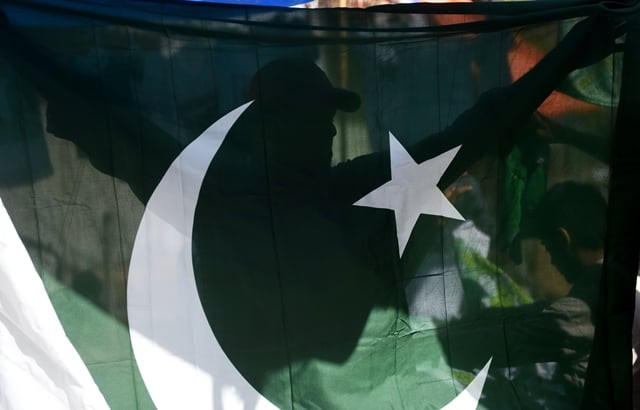Independence Day, Kashmir and the Two-Nation Theory
Decades-long atrocities in IoK has pushed scholars to reassess the credibility of the Two-Nation Theory

PHOTO: AFP
For Pakistanis, the monumental event not only signifies the creation of a separate homeland but it also serves as a reminder of the sacrifices that millions of men, women and children — who lost their lives during the partition of the subcontinent — rendered for the sake of the country in 1947.
The creation of Pakistan was based on the Two-Nation Theory — a premise which suggested that the Hindus and Muslims of India were two separate nations which needed their own geopolitical territories so that they could govern their lives according to their distinct religious teachings and practices.
'Unity, harmony needed to face challenges confronted by Pakistan'
During his presidential address as the leader of the All-India Muslim League on March 22-23, 1940, the founder of Pakistan Muhammad Ali Jinnah stressed that the notion of “one Indian Nation” is a misconception that will lead India to destruction if not addressed in a timely fashion.
“The Hindus and Muslims belong to two different religious philosophies, social customs, literature. They neither intermarry nor interdine together and, indeed, they belong to two different civilisations which are based mainly on conflicting ideas and conceptions,” Jinnah stated.
“To yoke together two such nations under a single state, one as a numerical minority and the other as a majority must lead to growing discontent and final destruction of any fabric that may be so built for the government of such a state.”
Since the creation of Pakistan, the Two-Nation Theory, however, has been widely criticised by many detractors who have claimed that it lost its validity in 1971 when Pakistan and Bangladesh parted ways with each other.
Others point out that had the theory been valid, then millions of Muslims would not have been able to survive in India for 72 years.
However, with the resurgent and seemingly indomitable Hindu nationalism in present-day India under the far-right leadership of Narendra Modi, the Two-Nation Theory has become more important than ever before.
Throughout his last tenure as the head of the Indian state, Modi -- who has been reelected this year -- there had been many atrocities committed against Indian Muslims.
When Muslims were lynched in India for allegedly eating beef by “cow protection groups” (cows are sacred in Hindu religion) or killed for even transporting cattle for slaughter, Modi mostly remained silent -- a move that led to an increase in attacks on Muslims.
Pakistan reaffirms support for Kashmir on 73rd Independence Day
As a result, India -- which was once hailed as a secular state -- is fast being engulfed by the dominant Hindutva ideology which states that India is the homeland of the Hindus alone.
What’s more, the decades-long atrocities committed by the Indian armed forces in the Indian Occupied Kashmir (IoK), together with the recent decision of the BJP-led Indian government to strip IoK of its special status, has pushed scholars to reassess the credibility of the Two-Nation Theory, which has become as important as it was at the time of Independence.
The Muslim-majority state of Kashmir and Indian atrocities
On August 5 and 6, the Indian government fueled Hindu nationalism by abolishing Article 370 of the Indian Constitution which preserved the special autonomous status of Jammu and Kashmir.
Under the article, the Muslim-majority state of IoK was allowed to have its constitution, a separate flag and independence over all matters except defence, foreign affairs and communications.
The abrogation of the article has opened the door for mass Hindu migration and settlement in IoK which, according to some critics, is akin to Israel’s occupation of Palestinian territory.
As the Indian government made the move, people living in the IoK were subjected to a complete telecommunication blackout amid troop deployments and curfews meant to suppress rightful protests in the state.
To condemn New Delhi’s attempts to change the demography of the disputed area and ethnic cleansing of Kashmiris, the government of Pakistan has decided to observe the 14th of August as the “Kashmir Solidarity Day,” The country will also observe August 15 -- the Independence of India -- as a “Black Day” to show solidarity with Kashmiris.
The situation in Kashmir and the validity of Two-Nation theory
Speaking on the rising of Hindu nationalism in India and the Indian/ Hindu insecurity that has been blatantly displayed in IoK of late, scholars and historians largely agree that the Two-Nation Theory, perhaps hold more relevance today than ever before.
According to Dr Huma Baqai, Associate Professor of Social Sciences and Liberal Arts at the Institute of Business Administration (IBA), Karachi, one of the worst things that the Indian PM Modi did after being reelected is using the unprecedented clout to illegally, immorally and unconstitutionally deprive Kashmir and Kashmiris of their identity.
“[The abrogation of Article 370] essentially means that even constitutional guarantees are insufficient to provide Muslims of Kashmir the protection that is their lawful right -- a right granted to them by the Constitution and the Supreme Court of India,” she told The Express Tribune.
IoK curfew to be eased after Thursday: governor
“More importantly one would assume a strong PM like Modi would not need Pakistan and Muslim bashing to raise his stature, however, on the ground, [turned out to be the opposite]; the minute he has the requisite power, he tramples upon Indian secularism, Indian constitutionalism and, most importantly, Indian democracy paving way for an extremist Hindu state.”
Dr Baqai added that the damage is irreversible and this proves that the Two-Nation theory, which became the basis of the creation of Pakistan, is more relevant today than ever before.
She pointed out that it’s not just Muslims, but all minorities and vulnerable groups that feel insecure under Modi. The Sikh and Christians have openly come forward to protect and stand for the Muslims of Kashmir.
“The tide of extremism Modi is riding upon seems unstoppable. If the Indian constitution, the sane and the liberals can’t restrain him, then it seems improbable for the international community to do so either.”
Dr Hasan Askari Rizvi, renowned Pakistani political scientist and military analyst who served as caretaker Chief Minister of Punjab, agreed that the rising Hinduism-based ultra-nationalism in India, which is sponsored by the Bharatiya Janata Party (BJP) and Rashtriya Swayamsevak Sangh (RSS) and backed by the Modi government, has targeted religious minorities, especially Muslims.
“These religiopolitical developments in India prove that Muhammad Ali Jinnah and his colleagues in the All-India Muslim League were correct in advocating the Two-Nation theory that maintained that there were two major nations in British India- the Muslims and others,” Dr Rizvi opined.
He said that the civilisational and cultural identity of the Muslims, their civil, political and economic rights and interests were threatened by an unsympathetic majority in United India. Therefore, Jinnah rightly argued that the Muslims needed a separate state to secure their future against the threat of being overwhelmed by a majority that adopted a non-accommodative and dismissive disposition towards their identity, rights and interests.
Shedding light on the relevance of the Two-Nation theory under the current circumstances, Dr Ayesha Jalal, acclaimed South Asian historian and a Mary Richardson Professor of History at Tufts University, United States, said that while the theory holds sway today, it has different meanings for Pakistan and India, therefore, it shouldn’t be invoked in the abstract.
“I would ground it in a specific period and be clear about what is being talked about under the rubric of the theory. As for Kashmir, I would emphasize the extent to which New Delhi’s recent decision and method of going about it has undermined the principle of federalism which is ostensibly the basis of the Indian union,” she said.
“If the net result of the BJP government’s high-handedness is a reaffirmation of the Two-Nation Theory for its adherents, so be it, but I can assure you that that is not the intention of the BJP duo that has masterminded this.”



















COMMENTS
Comments are moderated and generally will be posted if they are on-topic and not abusive.
For more information, please see our Comments FAQ